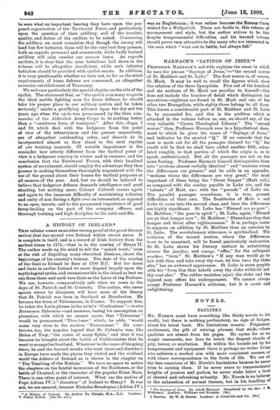HARNACK'S " SAYINGS OP JESUS."*
PROFESSOR HanNacx's sub-title explains the sense in which he uses the phrase " Sayings of Jesus,"—" the second source of St. Matthew and St. Luke." The first source is, of course, St. Mark. It may be well to recall the figures which show the relation of the three Synoptists. Five out of the hundred and six sections of St. Mark are peculiar to himself—this does not include the touches of detail which distinguish his narratives—eighteen are found in St. Mark and one of the other two Evangelists, while eighty-three belong to all three. This leaves a considerable part of St. Matthew and St. Luke to be accounted for, and this is the problem which is attacked in the volume before us, one, we should say, of the very valuable " Crown Theological Library." The " second source," then, Professor Harnack sees in a hypothetical docu- ment to which he gives the name of " Sayings of Jesus," and indicates by the symbol " Q." If we concede that the case is made out for all the passages claimed for "Q," the result will be that we shall have added another fifth, calm. lated roughly, to that portion of which the origin is, so to speak, authenticated. But all the passages are not on the same footing. Professor Harnack himself distinguishes them into "sections almost verbally identical" and "sections where the differences are greater," and he adds in an appendix, " sections where the differences are very great," the most important of these being the " Great Supper" (Matt. xxii.), as compared with the similar parable in Luke xiv., and the " talents " of Matt. xxv. with the " pounds " of Luke air. The parallel passages sometimes, it is true, present difficulties of their own. The 13eatitudes of Matt. v. and Luke vi. come into the second class, and here the differences are highly significant. St. Luke has "Blessed are ye poor"; St. Matthew, " the poor in spirit " ; St. Luke, again, " Blessed are ye that hunger now "; St. Matthew, " Blessed are they that hunger and thirst after righteousness." It is, perhaps, easier to suppose an addition by St. Matthew than an omission by St. Luke. The revolutionary utterance is spiritualised. The criticism of the second section, where the differences have to be examined, will be found particularly instructive. So St. Luke shows his literary instinct in substituting rinrretv for ear itetY, and rcipexe, "offer," for the colloquial arp0ov, "turn." St. Matthew's "If any man would go to law with thee, and take away thy coat, let him have thy cloke also," has an awkward appearance. St. Luke is more graphic with his "from him that taketh away thy cloke withhold not thy coat also." The robber snatches (alpvi) the cloke and the injured man offers his undergarment. We cannot always accept Professor Harnack's criticism, but it is acute and enlightening.






































 Previous page
Previous page